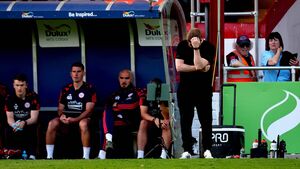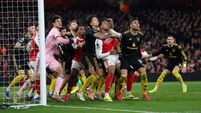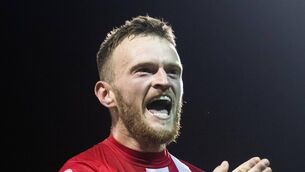League is bigger than Duff, but only just

Damien Duff dejected near the end of Friday's game between Shelbourne and Derry City in the SSE Airtricity League Premier Division at Tolka Park. Picture: INPHO/Ryan Byrne
Managerial departures tend to come at a time of real difficulty for a club and even though things haven’t been going brilliantly at Tolka Park, Damien Duff’s decision to resign as Shelbourne boss on Sunday afternoon was a bolt from the blue.
His utterances after Friday’s defeat to Derry City – when he questioned his players professionalism and commitment – were cutting and sharp towards his own squad, but we’ve seen and heard that before, particularly at various stages this season. Perhaps, his comments were a little more far-reaching than others but still, every manager tends to have a go at times.
His decision to depart, particularly at this juncture, is also at odds with so much of what we’ve heard from Duff before. Since his appointment in late 2021, he has always talked about his devotion to the job; how he loves the club and its people and how he could never be prised away.
In January of this year, when he was understood to be the subject of an offer from a big club in England, Duff told reporters: “As long as people want me in the league, I will be here. I’m not going anywhere regardless of somebody wanting me.” So his commitment to Shels was steadfast and cemented too by signing a fresh contract just a year ago.
Why now, then, having won the title last season and having spent so much time in building up the team and, to a large extent, the club, has Duff decided it’s the right call to walk out mid-season?
One has to imagine that, perhaps, he feels he wasn’t getting the same tune out of his players this season and that, ultimately, it requires a fresh voice to reinvigorate the squad. Shels have been on the back foot from an early stage in this campaign. Backing up last year’s unlikely title win, which few if any expected at the outset, was always going to be difficult.
They’ve only won seven times in their first 22 matches and lie sixth in the table as things stand. Yet, their 30-point total is just four off second-placed Drogheda United and they’ve also got a very winnable Champions League first round qualifier against Linfield dangling in front of them next month. It’s not even close to the territory in which the club would begin to even consider the manager’s position. All of that makes this decision from Duff slightly puzzling.
Perhaps there’s a sheer honesty from him in that, when he feels he has done all he can do, it’s time to leave. But one has to wonder – where to from here for Duff, Shelbourne and, indeed, the league itself?
Duff certainly got under the skin of rival fans, but I don’t think anyone involved in the League of Ireland can deny that he has been one of the major catalysts for the upturn in popularity for the domestic game since his appointment. You can point to lots of things that helped stimulate a greater interest and exposure for the league in recent seasons, but Duff’s arrival has to be part of that conversation. His impact, on Shels and on the wider domestic game, has been colossal.
Don’t forget that, when he took over, Shels had only just won promotion from the First Division. The glory days of the noughties were long gone; the club has flirted with extinction and the loss of their home at Tolka Park since then.
From solely a managerial point of view, his achievement in bringing the club to a first league title in eighteen years was an outstanding piece of work. The manner in which they did it, under so much pressure late in the season as their form wobbled at the most crucial of times, also pointed to a huge degree of togetherness in the dressing room.
Duff was central in building Shels up last season; he talked his players up when they needed that, and he was bullish about their chances from an early stage. They were buoyed by previous seasons under his watch, in which they reached an FAI Cup final and qualified for Europe, and that momentum carried into the title winning campaign.
A bit like Jurgen Klopp at Liverpool, Duff was able to motivate the support base too. They looked in sync; fans responded to his sidelines gesticulations, his fist pumps to the crowd and his general animated demeanour between minute one and minute 90. It looked like the perfect fit.
For Shels, it’s going to be an incredibly difficult assignment in trying to replace Duff. Who do you get that is going to even come close in terms of star power, aside from everything else? That’s why Duff’s departure is bigger than just Shelbourne. It’s not a stretch to say that this is a major blow for the league. Duff may not have been to the liking of everyone who watches on, but he compelled people to watch all the same. His quotes, after a Friday night match, were always must-watch or read material the morning after.
Personalities matter in sport, as do storylines, and Duff provided plenty of them, either intentionally or unintentionally. Plus, in a league starved of limelight, having a Premier League winner with 100-plus international caps patrolling the sideline each week was a real help when it comes to attracting the casual sports fan.
Perhaps Duff’s arrival in the league has opened eyes elsewhere to what’s happening in the Irish game and, if so, it’s another benefit of his tenure at Tolka Park. It might even help Shels in their pursuit of a new manager in the coming weeks. Whatever way you want to look at it, though, Duff’s departure from the league – for now – leaves a gap that will be difficult to fill.





